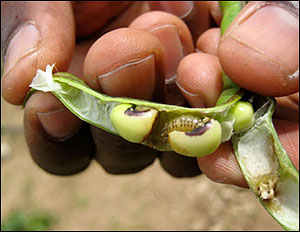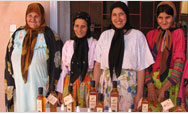Biotechnology
 |
|
The Maruca podborer, pictured here infesting a cowpea pod, causes significant yield losses. USAID supported the African Agricultural Technology Foundation (AATF) in establishing an international research partnership to develop new cowpea varieties that are resistant to the Maruca podborer. (Larry Beach)
|
In many developing countries economic growth and increased income-earning opportunities, especially for the rural poor, depend on the performance of the agriculture sector. Over the last 20 years, improved crop varieties have accounted for an estimated half of agricultural productivity improvements. As we face global population growth, increased competition for land and water resources from industrial and urban growth, climate change, and the need to protect the environment, we need new solutions to increasing agricultural productivity to combat hunger and poverty. Agricultural biotechnology offers an important tool, which along with traditional breeding, new technologies, and improved resource management, enhances crop, livestock, and aquaculture productivity. This increases the incomes of small-scale agricultural producers in an environmentally sustainable way by:
- Reducing pesticide use and excess fertilizer use that pose threats to biodiversity and human health
- Battling damaging plant diseases and pests by developing new resistant crop varieties
- Making widely grown food crops more resilient and stress tolerant, thereby helping farmers adapt to a changing climate
- Enhancing the nutritional quality of key staple crops to counter malnutrition and improve the health of farmers and consumers
- Enabling better livestock disease diagnosis and the development of more effective livestock vaccines
The USAID approach
USAID takes an integrated approach to ensure that countries can safely access biotechnology if they choose to do so and that a broader range of technology is available for the benefit small scale farmers. This is accomplished by building technical capacity in crop research and development and making sure that decision makers have the resources they need to make informed decisions about biotechnology and biosafety.
Since 1989, USAID has taken an innovative approach to biotechnology, integrating technological development with policy reforms necessary for safe and effective application in developing countries. Through USAID’s collaborative agricultural biotechnology programs, developing countries build the capacity to develop the crops they need in a safe manner. The programs engage the expertise of faculty and staff from U.S. and developing country universities, private sector, nongovernmental organizations, and international institutions such as the Consultative Group on International Agricultural Research (CGIAR) to form an integrated strategy for developing and managing this technology.
The Program’s goals are to:
- Develop new crops for smallholder farmers to improve food security and strengthen livelihoods
- Make farming systems more environmentally sustainable
- Help farmers adapt to and mitigate climate change
- Develop and strengthen biosafety systems to regulate biotechnology
- Increase developing countries’ capacity for technology development, biosafety evaluation and communication through short- and long-term training
- Increase public understanding of biotechnology and biosafety
- Help public research systems address regulatory and intellectual property rights issues as they move crops from lab to field
- Support environmental research to inform biotechnology risk assessment and management
Recognizing the wide range of issues, sometimes controversial, associated with biotechnology, USAID promotes safe application and supports compliance with national and international policies through the following policies and practices:
- Bioengineered materials intended for planting are transferred only with the host government’s explicit advance informed consent
- The capacity of partner governments to evaluate the safety of bioengineered products and manage their introduction is enhanced
- Environmental research to address the potential risks posed to biodiversity by bioengineered products is supported
USAID biotechnology programs and key implementing partners
USAID supports the Consultative Group on International Agriculture Research, a strategic alliance of members, partners and international agricultural centers that mobilizes science to benefit the poor.
The Program for Biosafety Systems supports the development and implementation of national biosafety systems in Africa and Asia.
The South Asia Biosafety Program is dedicated to helping the governments of Bangladesh and India strengthen the institutional governance of biotechnology.
The Agricultural Biotechnology Support Program II, a USAID-funded consortium of public and private sector institutions managed by Cornell University, focuses on the safe and effective development and commercialization of bioengineered crops as a complement to traditional and organic agricultural approaches.
The African Agricultural Technology Foundation has a mandate to access and deliver proprietary agricultural technologies for sustainable use by African smallholder farmers.
The Donald Danforth Plant Science Center conducts research on enhancing the nutritional content of plants to improve human health and increasing agricultural production to create a sustainable food supply.
Back to Top ^
|




